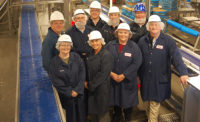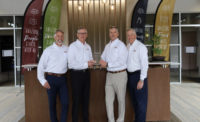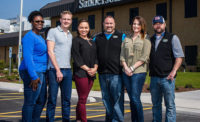Wayne Farms' planned precision

The best-laid plans of mice and men often go awry,” the English translation of the Robert Burns poem “To a Mouse” says.
Yet, in the face of tough economic times in recent years, the best-laid plans of Oakwood, Ga.-based Wayne Farms LLC have gone in another, more positive direction. These plans have not gone awry, in fact, finding success while staunchly supporting the company’s overall strategy.
Without a doubt, Wayne Farms has always had a plan — and for more than a decade at the least, that plan has revolved around its customers.
“We are a business-to-business company, really the only large, fully integrated poultry company focused on business-to-business and not a consumer brand,” Stan Hayman, director of marketing and business development for Wayne Farms, explains. “[We] focus on what’s important to the customer and what they need to drive their business. So we try to team up with customers, learn their business and drive that knowledge back into our organization and line up our people, resources and capabilities.”
In the past half-decade, success has met Wayne Farms’ plans to build and then expand a new plant in Decatur, Ala., as well as an innovation center in its Oakwood, Ga., headquarters. Furthermore, the consistent execution of the corporate mindset has allowed Wayne Farms to thrive on a different level than some of the retail-focused giants of the industry, all while following its own business model.
Preparation is nothing new to Wayne Farms, however. Take the newest customer-centric crown jewel: its Innovation Central facility, which includes a pilot plant and test kitchen at the company’s headquarters.
“We’ve had the name ‘Innovation Central’ trademarked for probably eight or nine years, knowing that the direction in which we were moving, this was going to be an important part of where we were going to go,” Hayman explains. “So we had that put together and in our portfolio waiting for that right time.”
The right time, Hayman adds, came when Larry Eisenberg, director of research and development and Innovation Central, began to put together his team of 20 food technologists, product leaders, managers and lab technicians, and began designing the facility. It’s a facility whose exterior probably would not win an architectural beauty contest, but that design came by choice, Hayman says.
“With us, it’s not so much a show thing,” he says. “So rather than having a place three times as big, I think it’s amazing what we do with the people we have and the capabilities we have. … We only need a place this big to do a lot of those same things.”
Eisenberg agrees that the biggest success in the early stages of Innovation Central has been the efficiency it has brought to the entire company, particularly in such a small space.
“When I first came on board, if a customer said they needed a 10-pound sample, we could knock that out in a heartbeat,” he says. “If they asked for a 100-pound sample, it would take us a day to a day-and-a-half to complete that with all our resources put against it.
“With our new facility, we’re making a 500-pound sample today, and that’s only part of our day.”
The efficiency created by the shift in resources helps Wayne Farms and its customers, and it allows the company to demonstrate how much of a focus customers truly are.
“My thought has always been: A nice, pretty [innovation center], how is it adding value to the customer?” Hayman asks. “It’s nice, and yes, everybody likes it, but at the end of the day, our job is to add value to our customer and help them drive their business. So if it doesn’t take a pretty building to do it, we’re going to invest those assets into the people, equipment and things we need in the production facilities to continually add value to their business.”
Product development at Wayne Farms in the “Innovation Central era” has benefitted significantly as well. In the past, Eisenberg says, a majority of the company’s innovative new products were ideas supplied by customers. Yet, today, Innovation Central has helped Wayne Farms shift that percentage toward itself — often surprising their own customers with the knowledge of their processes and the ideas that fit their needs.
“Customers love to come here, and our sales force loves to bring customers in, because they know they have a customer-friendly place to come to that is also consumer-friendly,” Eisenberg says. “We have opened our doors to our customers, whereas in the past, we’d send them a sample.”
The ability to work well with its customers is nothing new to many in the industry, and at Wayne Farms, it goes back to setting the tone. Hayman explains that the mindset and focus of the company have been in place since he joined Wayne Farms approximately 11 years ago, and those ideals were what attracted him to the company.
“People say, ‘What do you sell?’” Hayman says. “The natural response is, ‘chicken,’ but that’s not what we sell. We sell value, and chicken is the vehicle by which we deliver value. So it’s no longer taking a chicken breast and telling the customer we have a chicken breast for them. … It’s really trying to say that we want to bring them a solution that adds value, so they can take it and evaluate if they can really make money.”
The latest 'Creations'
The master plan at Wayne Farms LLC has always included clear forward thinking as to where a customer-focused strategy might take the company. Though Wayne Farms traditionally has been a co-packer, private-label and foodservice supplier, it has had its eyes on entering the retail marketplace for some time now and is ready to ramp up production on its newest item, the Quick Creations line of fully cooked, frozen chicken products.“The concept of Quick Creations has been around a while,” Stan Hayman, director of marketing and business development, says. “It’s something we’ve had on the boards in the back of our minds, with the thought that we’d be moving into retail at some point. Once we made the strategic decision that [retail] looked like a business segment we really needed to participate in, Quick Creations was something we had that we could pull out and start using.”
Wayne Farms has begun to make the jump and expects Quick Creations to be available nationwide later this year. Hayman says the biggest challenge has been adjusting to the dynamics of returning to the retail marketplace with a brand that the company owns, but the company believes its customers will respond positively to the new product line.
Wayne Farms'Decatur West plant
In 2006, Wayne Farms LLC opened its Decatur West facility, a 133,000-square-foot processing facility in Decatur, Ala., on the same acreage as the company’s Decatur East plant, which had been built in 1998. With plenty of room for expansion and an innovative design approach to food safety and security, Decatur West is a design gem, and The National Provisioner sat down with Heath Loyd, operations manager, to discuss the plant’s specifics.NP: Talk about the food-safety and biosecurity initiatives that have been undertaken here at the Decatur West facility.
Loyd: Those initiatives revolve around the big focus here, which is on food safety and micro elimination and prevention in our facility. We have everything separated out from raw to ready-to-eat. The employees who work on the raw side, their badge will only allow them to visit the raw side, unless they have approval from HR and production. So everything, all the way down to the oven techs, … our sanitizers, our bio rooms, all the way down to our equipment, our desks; everything is focused on food safety and prevention.
NP: Decatur West has already been expanded twice, even though it was just built two years ago?
Loyd: It was expanded, and there was expansion room built into it originally. But this plant was designed to be expanded in three phases. We just finished Phase Two, which was the Line 53 expansion. Phase Three will be the future Line 54, which is currently an empty area. The construction you see coming up the road is the 15,000-pallet freezer that will house finished product from both Decatur East and Decatur West. There will be a conveyor and elevator that comes across from the road, goes overhead, and our product will go directly off our shipping dock and into the freezer.
NP: What technological initiatives make this plant state-of-the-art in terms of its processes?
Loyd: We were in a position where everything was brand new [here] — it was a green-field operation, and we had the opportunity to get top-of-the-line equipment. We had great support from a lot of our vendors in terms of training our employees on those technologies, which was a huge challenge, and it still is. You get new employees in here trying to run this equipment, they have to have some skills, and our HR department has had some challenges getting people in that can run the equipment. But the technology is state-of-the-art, maximizing throughputs and yield, because, for example, the ovens allow you to cycle different steam modes and oven modes into a particular product. That sets us apart and allows us to be very efficient.
NP: In terms of the employees at Decatur West, were they all new hires that were brought in when the plant was built, or were they taken from within Wayne Farms?
Loyd: There were several key positions that were transferred from the Decatur East facility and the fresh facility [down the road] to get the plant started. Beyond that, they were all new employees.
NP: How many employees are in the Decatur West facility?
Loyd: There are about 295 employees.
NP: What type of expansion, in terms of the employee base, can this plant hold?
Loyd: If volume and need are there, over the next six or seven years, you could probably see at least two more lines, so it could possibly double. We’re lucky to be in this area, the labor pool is flowing well, and we don’t think we’ll have any trouble. The poultry market’s good, consumption is good, although prices could be better.
NP: Talk about the challenge of driving home the importance of food safety and security to plant employees.
Loyd: We have several different training programs we go through from a microbiological standpoint. We do ongoing training monthly and have requirements from several different customers that we have to transfer to the employees on personal hygiene and GMPs. We go over that daily with the supervisors, and it’s so important to us. We have nothing to hide — when our customers come in here, they’re free to talk to hourly employees or anybody they want. So we’re really comfortable with that because we do the due diligence to transfer that to our employees and drive it home every day.
NP: How do you approach workplace safety, food safety and product quality in your plant?
Loyd: We really push the communication between our managers, supervisors and hourly employees. We want the hourly employees to know everything that we know from a customer standpoint about the customer, the products, the expectations, and what we, as a team, have to do to provide that level of quality to them. So it’s not uncommon for us to be in some type of communication meeting with several upper-level managers and several hourly process operators, talking about test-runs and protocols for customers coming in. It’s also not uncommon to have hourly employees in the meetings with customers here at the facility. So there’s a level of comfort there with the customers, I think, that we’re leaving it all on the table and there’s nothing to hide. And we take great pride in that.
Looking for a reprint of this article?
From high-res PDFs to custom plaques, order your copy today!







